On the eve of her famed restaurant’s
closing, chef Anita Lo ’88 contemplates
the transition ahead.
Columbia College | Columbia University in the City of New York
On the eve of her famed restaurant’s
closing, chef Anita Lo ’88 contemplates
the transition ahead.
When I learned that chef Anita Lo ’88 would be closing her acclaimed West Village restaurant, Annisa, it came as a surprise — Lo has been a fixture atop the notoriously fickle New York City dining scene for more than 17 years. In 2014 The New York Times lavished three stars upon Annisa, with critic Pete Wells declaring, “[T]he city is a more exciting place for it.”
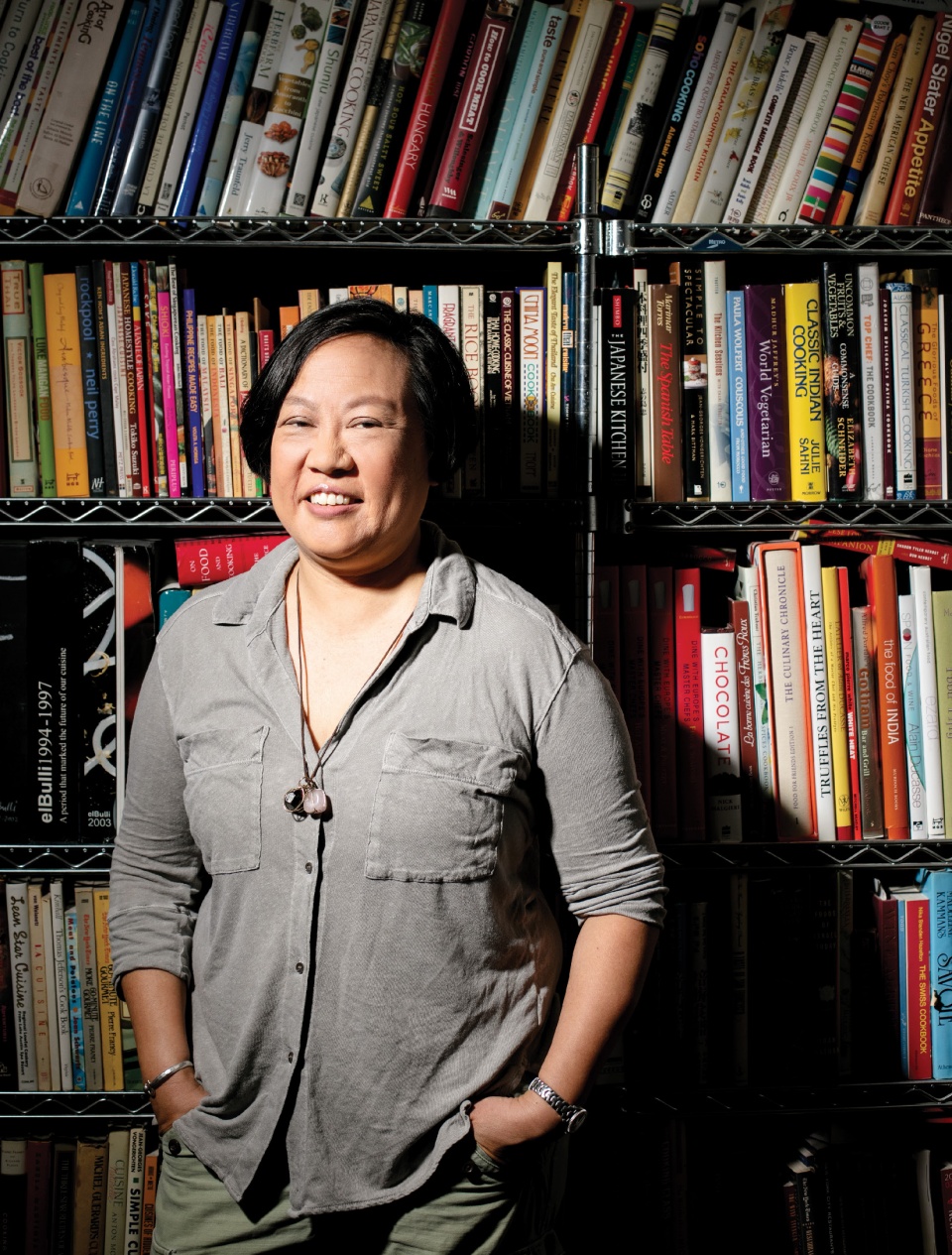
Where would she go from here?
I’d heard Lo speak a few years ago at Cherry Bombe Jubilee, a conference celebrating women and food, but much of what I knew about Lo I’d learned from seeing her on TV. She competed on Top Chef Masters in 2010 (her braised daikon with steak tartar, egg yolk and chili sauce looked amazing!). Five years earlier, she was the first woman to face off in Iron Chef’s Kitchen Stadium, beating Mario Batali in “Battle Mushroom,” where her use of subtle flavors bested the bolder Batali in dishes scored for taste, plating and originality.
Digging further, I also learned that Lo has one of the most impressive culinary bios of anyone in the United States. She was raised in Birmingham, Mich., and grew up in a Chinese-American family that valued food and travel. Lo became an inveterate world traveler and is known for finding inspiration in the foods she’s tasted in various exotic locales. She landed her first restaurant job in 1988, at the upscale French restaurant Bouley, and in 1990 enrolled in the prestigious Ecole Ritz Escoffier culinary school in Paris. While in that city, she also had stages (apprenticeships) at the Michelin-starred Restaurant Guy Savoy and Michel Rostang (now Maison Rostang).
Lo returned to New York in 1991 and worked each station at Chanterelle. In 1996, as the executive chef at Mirezi, she earned a two-star review from Ruth Reichl in The New York Times for interpreting Korean cuisine to appeal to Americans.
Lo opened Annisa (“women” in Arabic) in 2000 as a showcase for her global cooking style and a year later was named one of the “Best New Chefs in America” by Food & Wine magazine. Annisa was destroyed by a fire in 2009; it reopened in 2010. Now that the restaurant would be closing forever I needed to have the experience of eating there; while the clock was ticking (the restaurant closed May 27), I made a dinner reservation.
On a crisp spring night, I met my friend Davis at Annisa’s elegant bar, next to the entryway. The host guided us to our table, and we sat side by side. The room was intimate — 13 tables — and simple, with warm tones and muted colors: earthy pink banquettes, cream-colored walls and golden light. The lighting had to be some of the best in any restaurant in New York City; it was soft and flattered everyone.
We ordered Lo’s famous foie gras soup dumplings for our appetizer and agreed they were sublime — silky in texture, umami flavors with notes of star anise and cinnamon. They were astoundingly delicious. For my main course I had sea bass and Davis had striped bass. Both were gorgeously presented. We promptly posted photos to Instagram, then savored every perfectly cooked bite. Dessert was butterscotch beignets and a hazelnut torte — both winners. Afterward we received an extra treat of a chocolate drop with a small mint leaf alongside it and a piece of crystallized ginger next to a tiny blood orange popsicle. The post-dessert served as a miniature, less sweet, more modern version of petit fours. Genius!
When Lo and I sat down to talk I happily learned we have a number of things in common: We both studied French, went to Reid Hall, attended culinary school in Paris and authored cookbooks for solo diners. We spoke about how the NYC dining scene has changed, the reasons she’s moving on and what she wants — and doesn’t want — to do now.
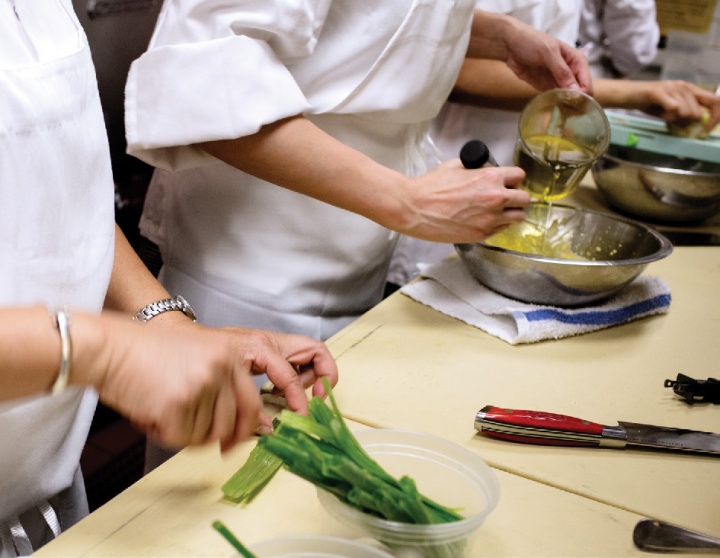
Klancy Miller: Why did you choose the College?
Anita Lo: It was important to me that I go to a good school; I came from an environment that valued Ivy League schools. My brother, James ’83, went to Columbia, too. He graduated the same year as Obama.
You studied at Reid Hall. Do you think majoring in French led to your culinary path?
It’s not quite as direct. I think being in France and their focus on food was just a perfect segue for me on some level.
How has NYC dining changed in your view as both a New Yorker and as a chef during the past 30 years?
I think it continues to get more diverse. Chefs were focused on French cuisine when I was coming up. And it was also fine dining — really formal both in service and in cuisine. Fine dining has certainly branched out from there. On some level it’s not necessarily as fancy, but there’s still room for all of that. We still have that at Daniel. We still have that at Bouley. Molecular gastronomy happened. That wasn’t around back then. It’s just become less Franco-focused.
How would you describe the restaurant climate now versus then in terms of the economics of running a restaurant?
It’s a completely different business model now, especially if you go into the “no-tipping” model. Our cooks have different focuses. Back in the day we all wanted to hone our craft. We were willing to put in six-day workweeks, 12–15-hour days — and everyone wanted to go to France. Nowadays I think people are more worried about money, and I guess rightly so. It’s impossible to live on a cook’s salary here unless you have help from your family. It’s just a lot of sacrifice.
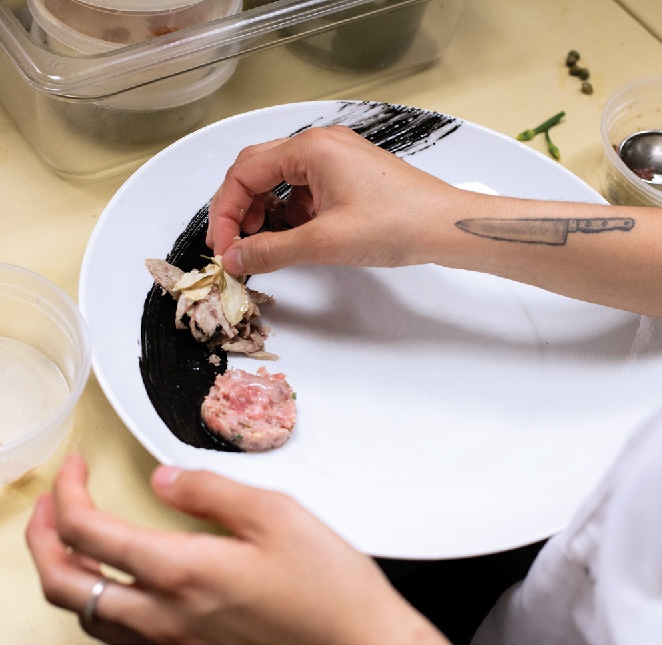
I read your piece in Eater [February 11, 2016] about how a service-included model can be devastating as a business owner.
In New York, the minimum wage will increase to $15 in 2018. This will affect restaurant owners and how they will pay their staff, especially non-tipped employees in the back of the house like cooks and chefs. Whereas servers can earn three times as much because of tips, the wages for cooks have been stagnant and much lower. Many restaurants have switched to service-included systems in order to pay staff more equitably, to recruit and retain a high-quality kitchen staff and to avoid the massive discrepancy between wages. Restaurants that make the change to service-included menus must increase the cost for items on the menu in order to cover the cost of increased wages. This is tricky because a customer might experience sticker shock due to the higher costs on the menu. Annisa experienced a decline in customers after switching to a no-tipping system.
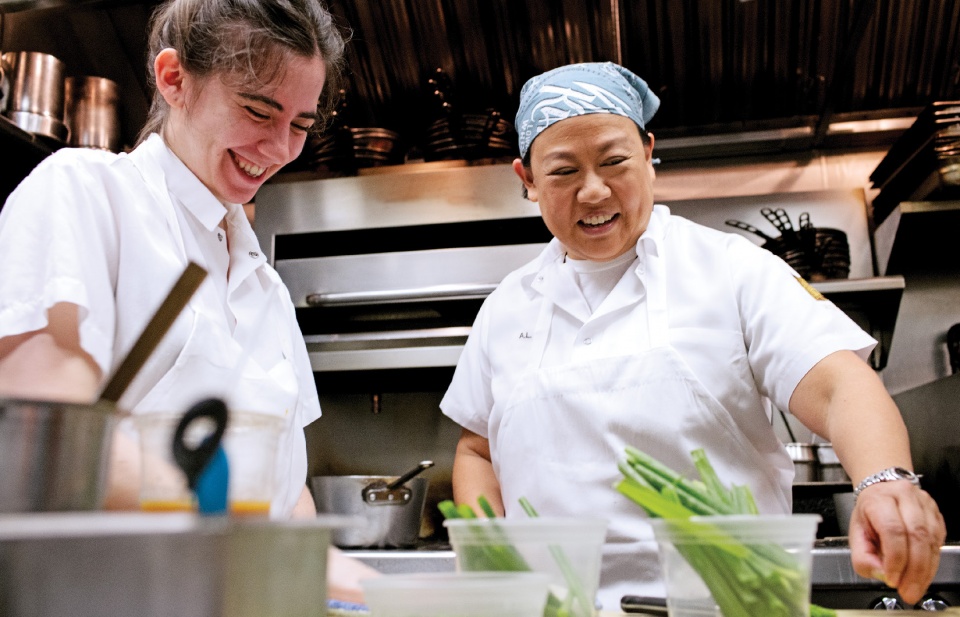
“I’m not opening Annisa 3.0.
It’s not happening.”
Is that part of why you decided to close?
There were a million other reasons to close. The little cuts were making me do something I wanted to do anyway. The financial situation just helped me to get to that point. We were having increases across the board: minimum wage, the price cap of what to charge — we had to raise our prices for no-tipping, real estate taxes were going up, infrastructure was crumbling — there were $30,000 worth of repairs and also labor issues. It could keep going but I would have had to cut people’s hours back. It’s not sustainable for them either. You can’t live anywhere in New York on $15 or $20 an hour. It doesn’t feel good to run a business like this anymore.
Will you open another restaurant?
I definitely don’t want to open another restaurant. I’ve been doing this almost 30 years; that’s enough! And it’s a young person’s job. Not that older people can’t continue to do restaurant work, but not on the scale that I want to do it. At this point I don’t want to have an empire. That being said, I might open my partner Mary Attea’s — who’s also my chef de cuisine — restaurant down the line. But I’m not opening Annisa 3.0. It’s not happening.
What’s next? What do you most look forward to?
I’m really looking forward to taking some time off. My partner and I take a 10-day break every year and I go on trips all the time but they’re usually work trips. Some of them are very pleasurable but it’s not like sitting on a beach for 10 days. I’m gonna take a year off. I’ve got some great travel coming up. And then I’m going to figure it out. I know that I’m going to continue to write — I had a column for about a year. I would look into that again. But I don’t know. I don’t feel any pressure to figure it out.
Is it a relief not to feel any pressure? To not have things laid out?
I think I will feel that pressure in another year but I don’t feel it now. I’ve been successful. I don’t really feel like I have to prove anything more right now [as far as cooking professionally]. I am very worried about being bored. I would love to find something that’s engaging and exciting that makes me feel that I’m giving back to the community at large.
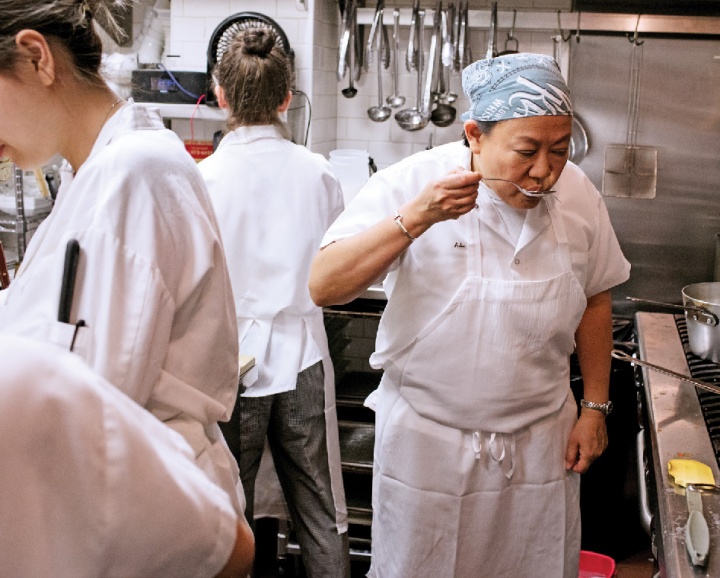
Where are you planning to go?
In September I’m going to Sicily. I have never been. I’ve actually never been to southern Italy. I’ve never been to Rome, which, as a food person at my age, I think that there’s something wrong with that, and I’m going to fix that right now. I’m going with a culinary diplomacy program and I’m going to talk with refugees, and there’s a couscous festival that I’m going to be part of. I’m so excited!
After that, I hope, Mexico. I guess I’m not really taking a year off ! I’m hosting a culinary trip to the Yucatan. And then I’m going to Ethiopia for the sesame harvest. I’m really excited for that. I’ve always wanted to go to Ethiopia. I’m going with Soom [a purveyor of premium quality tahini]; I’ll probably go to Asia in the winter. My sister lives there so we’ll stay with her for a little bit. I really want to go to Cambodia; I’ve never been. A friend wants to go to Thailand. I’ve been there a lot but my partner hasn’t been. We’ll probably do all of that. I have two aging dogs and a cat, so I’m not quite sure — I don’t know how I feel about leaving my old dogs for so long.
You mentioned that you might help your partner open a restaurant. How important is mentoring for you? Is it built into the role of chef?
I don’t think it’s necessarily built into the role of chef, but I think it should be. I think it’s key, actually. Cooks really make nothing. It’s all about passion and love and the fact that they even work for you … as long as they haven’t left you in a bad way and they didn’t do terribly, I think you owe it to them to be there for the rest of their career.
With Annisa closing, have you seen people from your past?
Tonight we have three former employees from Portland, Ore. — they had all moved to Portland but when they heard [that we’d be closing] they booked a trip just to come. Oh my God! So amazing. A lot of former employees have come by, and a lot of old regulars have come by, so it’s good.
Are you working on any writing projects?
My cooking-for-one book is in editing right now. I don’t want to start another one until this is done.
“Cooking was an obsession for me ...
I hope I will find something else like that.”
How did the book come about? What’s the title?
It’s called SoLo: Easy, Sophisticated Recipes for a Party of One. It came about because a friend and I were trying to name something and then he started riffing on my last name and said, ‘You could do something on “Lo-country cooking.” You could do “SoLo… ”’ and it kept on going. We came up with 50 titles. And I thought, ‘Oh my God, I should do the cooking for one!’ because I’m so neurotic about waste and I thought it would be easy because the recipes have to be easy. My editor is Haruki Murakami’s English editor. It should be out in 2018, probably in the fall.
Will there be a book tour?
I’d like to do one. I love the city but I don’t think I can do the city all the time. I need different scenery sometimes.
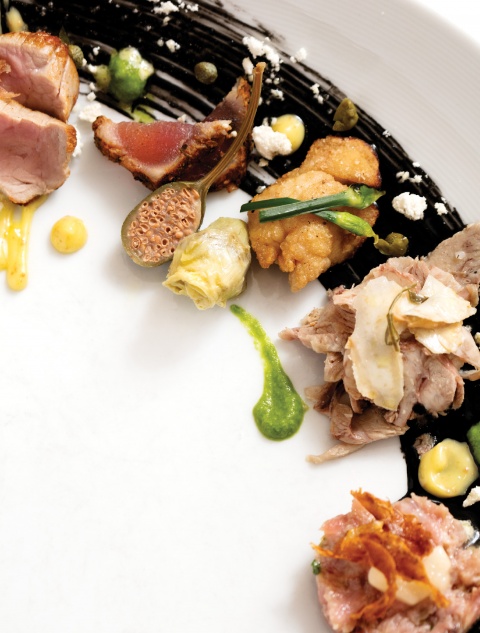
Are there any other wishes you have for yourself as you’re making this transition?
I hope that I will still get invited to do charity events and travel events. Cooking was an obsession for me … I hope I will find something else like that as well.
What about reading? Reading and travel go well together.
I used to be an avid fiction reader and that’s another thing I’d like to get back to. I just read The Vegetarian, by Han Kang; it was amazing.
After speaking with Lo, I wanted to experience Annisa again, and this time I chose to dine alone. I’m glad I did. I took in all the details: the simplicity of the white tablecloths, the candles casting golden light across the tables; Ella Fitzgerald singing “Midnight Sun” in the background. Annisa was elegant and intimate, yes, but even more than that, it felt soothing — the ideal place to relax and savor great food.
To start, the waiter brought the tiniest piquillo pepper tart. I ordered the fresh field greens salad as an appetizer and then the barbecue squid with peanut and edamame, followed by the same delicious sea bass that I had the first time — I had been craving it. Lo came into the dining room to say hello; that was a happy surprise. While I finished my meal I spied another party of one. I found myself grateful to be at Annisa in its last days, alone, feeling the spirit of Lo’s upcoming book. Indeed, SoLo.
Klancy Miller ’96 is the author of Cooking Solo: The Fun of Cooking for Yourself. She is a writer and pastry chef deeply fascinated by all things French. After graduating from the College and working in international development in French Polynesia, she earned a diplôme de pâtisserie from Le Cordon Bleu Paris. Miller was a commentator on the Cooking Channel show Unique Sweets and has contributed to Food Republic, Bon Appétit, Cherry Bombe, The Washington Post and Food52.

Published three times a year by Columbia College for alumni, students, faculty, parents and friends.
Columbia Alumni Center
622 W. 113th St., MC 4530, 6th Fl.
New York, NY 10025
212-851-7852
cct@columbia.edu

Columbia Alumni Center
622 W. 113th St., MC 4530, 4th Fl.
New York, NY 10025
212-851-7488
ccalumni@columbia.edu